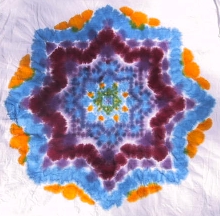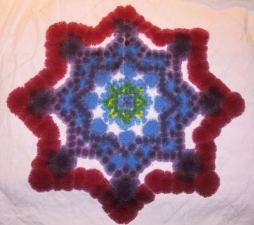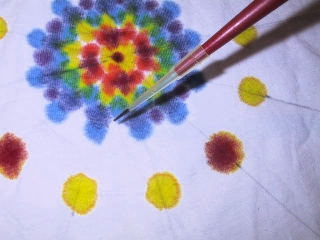

 This is actually the back of the shirt shown in example 21. I placed an aluminum
baking sheet between the two layers to prevent
bleed-through.
Aluminum must not be allowed to contact damp
soda ash, as the high pH degrades aluminum badly (as does a
low pH). Though exposure to the dry soda ash in this case
appears to have done no harm, even this should not be
attempted with a baking sheet you plan to keep. Wet soda ash
in contact with aluminum may ruin not only the aluminum,
but also any fabric in contact with it.
This is actually the back of the shirt shown in example 21. I placed an aluminum
baking sheet between the two layers to prevent
bleed-through.
Aluminum must not be allowed to contact damp
soda ash, as the high pH degrades aluminum badly (as does a
low pH). Though exposure to the dry soda ash in this case
appears to have done no harm, even this should not be
attempted with a baking sheet you plan to keep. Wet soda ash
in contact with aluminum may ruin not only the aluminum,
but also any fabric in contact with it.
 As on the previous page, I used an Eppindorf automatic
pipettor (non-electronic,
mid-1980s model) to drip carefully metered droplets, from 5 to
200 microliters each, depending on the size of dye dot
desired, onto a cotton knit shirt which had previously been
soaked in a solution of 1 cup (250 ml) of soda ash in 1
gallon (4 liters) of water, then line-dried. The dyes were
Procion MX type dye, mixed at approximately 4 teaspoons (20
ml), by volume, per cup of water, along with 1 tablespoon
(15 ml) of urea per cup of water; more was used for black
and turquoise.
I dyed the background after dyeing the mandala. This was, in
my opinion, a mistake. In the future I will dye the
background first, then fill in the mandala, to avoid messing
up any of the fine details of the mandala itself.
As on the previous page, I used an Eppindorf automatic
pipettor (non-electronic,
mid-1980s model) to drip carefully metered droplets, from 5 to
200 microliters each, depending on the size of dye dot
desired, onto a cotton knit shirt which had previously been
soaked in a solution of 1 cup (250 ml) of soda ash in 1
gallon (4 liters) of water, then line-dried. The dyes were
Procion MX type dye, mixed at approximately 4 teaspoons (20
ml), by volume, per cup of water, along with 1 tablespoon
(15 ml) of urea per cup of water; more was used for black
and turquoise.
I dyed the background after dyeing the mandala. This was, in
my opinion, a mistake. In the future I will dye the
background first, then fill in the mandala, to avoid messing
up any of the fine details of the mandala itself.

Page created: March 23, 2003
Last updated: March 23, 2003
Downloaded at: Sunday, February 22, 2026